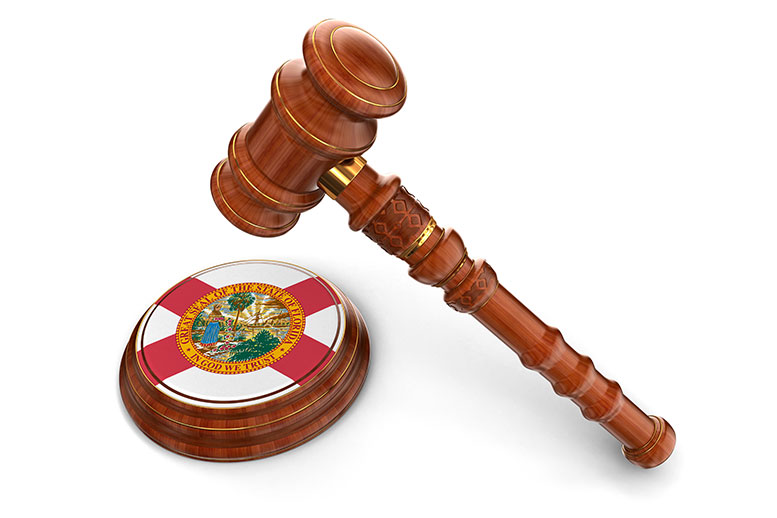Are you worried about Florida’s tough laws on repeat offenders? The state has a Three Strikes Law that means big trouble for people convicted of three serious crimes, like robbery or murder.
This blog post will guide you through what the law says, who it affects, and how it works. Stay with us to learn more!
Key Takeaways
- Florida’s Three Strikes Law gives a mandatory life sentence without parole to those convicted of three serious felonies, such as murder or robbery.
- The law focuses on violent crimes and does not count non – violent offenses as strikes towards the mandatory sentencing.
- Judges have some flexibility in sentencing, allowing for departure from mandatory sentences under certain conditions. Efforts are ongoing to reform this aspect and provide more discretion.
- Criminal defense attorneys play a key role in defending those charged under this law, aiming to reduce penalties and negotiate lighter charges.
- There have been calls for reforming the law due to concerns about its fairness and impact on minorities and economically disadvantaged groups.
Understanding Florida’s Three Strikes Law
Florida’s Three Strikes Law aims to keep repeat offenders off the streets by imposing a mandatory life sentence for those convicted of three qualifying felonies. This law focuses on serious crimes like robbery, assault, and murder.
For these offenses, minimum sentences can range from ten to twenty-five years or even result in a life term without parole. The goal is simple: if someone commits these severe crimes thrice, they get a life sentence.
The law only counts violent felonies as strikes. These include actions such as taking someone’s life, sexual assault, stealing with force, setting fires intentionally, or abducting someone.
Non-violent acts do not lead to strikes under this rule. This ensures that the harshest penalties are reserved for those who pose a real threat to public safety through repeated violent behavior.
Who is Affected by the Three Strikes Law in Florida?
The Three Strikes Law in Florida hits hard against people who have committed several violent or serious crimes. If someone has two prior felony convictions and then commits a third qualifying felony, they face a severe penalty.
Qualifying felonies include very bad acts like murder, sexual battery, robbery, stealing into homes (burglary), setting fires on purpose (arson), or taking someone against their will (kidnapping).
This law targets individuals known as “career criminals” – those who keep breaking the law in big ways.
People with past felonies are closely watched under this rule. Once they hit their third strike for certain crimes, they get a mandatory life sentence. This means if they are found guilty again of any of these serious offenses, the court must send them to prison for life without the chance to leave early on parole.
It’s a tough way to stop repeat offenders from committing more crimes.
Next up: Types of Three Strike Crimes in Florida.
Types of Three Strike Crimes
Florida’s Three Strikes Law targets serious crimes to keep communities safe. It covers a wide range of felonies, making sure repeat offenders face tough consequences. Here are some key types of crimes that count as strikes:
- Violent Offenses: This includes actions where someone hurts or threatens to hurt another person seriously. Examples are murder, robbery with a weapon, and aggravated assault.
- Sexual Crimes: These are offenses that involve forcing someone into unwanted sexual activity. Rape and child molestation fall under this category.
- Drug Trafficking: Selling illegal drugs like heroin or cocaine in large amounts leads to serious penalties under the law.
- Burglary of a Dwelling: Breaking into someone’s home with the intent to commit a crime inside counts as a strike.
- Arson: Setting fire to buildings or land on purpose is also considered a severe felony.
- Kidnapping: Taking someone against their will and moving them to another place is a significant offense.
Each of these crimes shows why Florida takes its Three Strikes Law seriously. The goal is to stop people from committing more crimes by imposing harsher penalties each time they offend.
Next, we’ll explore the consequences of hitting three strikes in more detail.
The Consequences of Hitting Three Strikes
Hitting three strikes in Florida means a person faces mandatory life sentences. This rule applies to repeat felony offenders who commit serious crimes three times. The state wants to stop these habitual offenders by making the punishment severe.
After the third strike, life in prison without parole is certain. People must think hard before breaking the law again.
A third strike seals your fate with no keys to freedom’s gate.
Courts do not count non-violent offenses as strikes. This shows Florida targets those who pose a real threat to safety and peace. Life behind bars becomes a reality for those unable to change their ways after multiple chances.
This strict approach underlines seriousness in fighting crime and protecting communities from dangerous individuals.
Legal Implications of a Three Strikes Initiative
Florida’s Three Strikes Law, with its mandatory life sentences for repeat felony offenders, has sparked legal debates and challenges. The law provides some level of discretion in sentencing but has faced claims of violating constitutional rights due to its harsh punishments.
Over the years, there have been efforts to amend the law to grant judges more flexibility in imposing sentences, especially considering circumstances such as non-violent offenses or if the defendant committed their third strike as a juvenile.
These changes aim to address concerns about fairness and proportionality in sentencing under this law.
The ongoing discussions around Florida’s Three Strikes Law highlight the evolving nature of legal implications concerning repeat offenders. Amendments granting flexibility for judicial discretion amidst challenges on constitutional grounds demonstrate the complexities associated with minimum mandatory sentencing guidelines.
This dynamic environment is further influenced by reform bills and resistance from various stakeholders within the criminal justice system, reflecting an everchanging landscape demanding careful navigation by legal professionals representing affected individuals.
The Role of a Criminal Defense Attorney in Three Strikes Cases
A criminal defense attorney serves as a crucial advocate and intermediary between individuals facing three strikes charges and the state attorney. They meticulously review probable cause for procedural errors, depose witnesses, negotiate for lighter charges, participate in jury selection, and vigorously defend their client in criminal court.
In Florida’s Three Strikes cases, these attorneys play a pivotal role in navigating the complex legal realm and seeking to mitigate the severe consequences of hitting three strikes under the law.
Frequently Asked Questions About Florida’s Three Strikes Law
What is Florida’s Three-Strikes Law?
Florida’s Three-Strikes Law means if someone commits three serious crimes, they can get a life sentence in prison without the chance for parole.
Does the FL Three-Strike law apply to medical professionals like doctors?
Yes, it applies to everyone, including doctors. If a doctor faces three charges of medical malpractice proven with clear and convincing evidence, they could face severe penalties under this law.
Can physicians lose their license because of the Three-Strikes Law?
Absolutely! Physicians can lose their medical license if found guilty of repeated offenses that harm patients, showing negligence or malpractice.
How does the Florida Three-Strike law determine if someone has committed a third strike?
The court uses evidence from trials or hearings to decide if an act counts as a third strike. The standard proof required might vary but often needs clear and convincing evidence for medical cases.
Are there any exceptions or ways to avoid mandatory life sentences under this law?
In some cases, mitigating circumstances might influence sentencing. Also, individuals may seek pardons or argue against their conviction based on new proofs to avoid mandatory life sentences.
How does the Three-Strikes’ Law affect health care providers’ insurance premiums?
Insurance companies might raise premiums for health care providers at risk of hitting their third strike due to increased liability insurance costs related to potential litigation and compensation claims.
What is Florida’s Three Strikes Law?
Florida’s Three Strikes Law imposes mandatory life sentences for repeat offenders convicted of three qualifying felonies, including murder, sexual battery, robbery, burglary, arson, or kidnapping.
Are judges allowed any discretion in sentencing under the law?
Yes, the law has been amended to allow judges to depart from the mandatory sentence in certain circumstances.
What are some examples of qualifying felonies under the Three Strikes Law?
Qualifying felonies include robbery, assault, aggravated child abuse, kidnapping, and murder.
Have there been calls for reform of the 10-20-Life law?
Yes, high-profile cases like that of Robert DuBoise have drawn attention to the flaws in the law and led to calls for reform by lawmakers in Florida.
How has the Three Strikes Law impacted certain groups?
Critics argue that the law’s harshness and lack of judicial discretion in sentencing have led to a disproportionate impact on minorities and the poor.
Has there been any legislative action regarding this law?
Yes, lawmakers in Florida have introduced bills to modify the law and give judges more discretion in sentencing.
Can a criminal defense attorney assist with cases involving this law?
Absolutely, a Florida criminal defense attorney can play a crucial role in representing individuals facing charges under Florida’s Three Strikes Law.
Is there any chance for offenders sentenced under this law to receive a pardon?
Currently, offenders sentenced under this law face mandatory life imprisonment without the possibility of parole.
Are there specific offenses that result in mandatory life sentences under the 10-20-Life law?
Yes, certain violent offenses such as robbery, assault, aggravated child abuse, kidnapping, and murder trigger mandatory life sentences under this law.

 CALL US NOW
CALL US NOW







